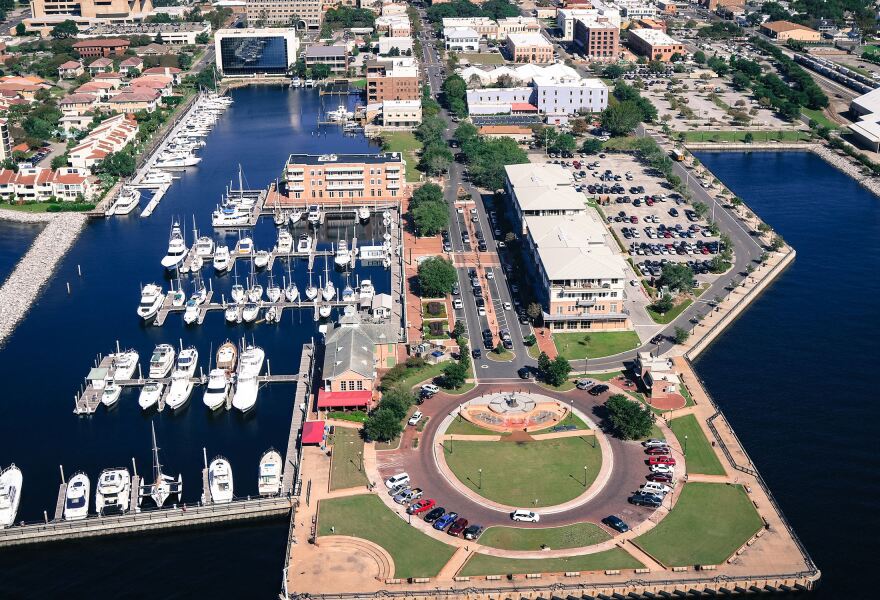COVID-19’s impact on municipalities was the topic of a virtual congressional briefing on the need for direct federal assistance to America’s cities, towns and villages. And Pensacola had a voice in the proceeding.
Pensacola Mayor Grover Robinson and the other panelists illustrated the urgent need for Uncle Sam’s help in stabilizing local government operations, keeping workers on the job, facilitating the reopening of America and in turn, jump-starting the national economic recovery.
“Local governments continue to be on the front lines of our nation’s health, safety, and economic response to this COVID-19 pandemic,” said Kathy Maness, who is on the town council in Lexington, South Carolina, and 1st Vice President of the National League of Cities. She moderated the meeting.
“Our communities and residents need a strong government partnership to grow the economy, and for our collective recovery,” said Maness.
Mayor Robinson told the virtual panel that Pensacola’s response to the coronavirus pandemic is a “tale of two cities” when it comes to revenues. One example he gave was how the airport has been bailed out by the CARES Act – the $2 trillion economic relief package.
“We went from 3,400 people leaving per day, to 200,” said Robinson. “We’re now back up to a little bit over 1,400 but the hit we took there and the revenue loss – without the CARES Act – it would have bankrupt [sic] an airport. We would not have been able to provide that service.”
Another city service impacted by the coronavirus, and the resulting stay-at-home order and working from home, has been the sanitation department.
“Everybody decided to put out more stuff [and] do more yard work; our yard debris went from 30 tons a day to 100 tons a day,” the mayor said. “We’ve had more stress in our sanitation than we’ve ever had at any time before; at the same time we’re dealing with having no revenues. So that’s kind of a tale of two cities.”
Meanwhile, in Grand Junction, Colorado, City Manager Greg Caton says their biggest COVID challenge is also finding the money to keep the lights on.
“We’ve estimated a shortfall in our sales tax and our revenue streams of 25 percent; we are primarily driven by sales tax, being 60% of our general fund,” Caton said. “So when people are not consuming, we’re not generating that type of revenue.”
The panel also discussed public health in the midst of the pandemic. Moderator Kathy Maness said the number of cases there aren’t expected to drop anytime soon.
“I’m in Lexington County and we just got named a ‘hot spot’ this week,” she said. “South Carolina, since last Friday, our numbers – the last two days – we’ve been over 500 [cases]. That is very discouraging and I’m hoping things are going to get better.”
Mayor Grover Robinson told the panel that a priority is keeping the public updated. In Escambia County, for now, there are 907 cases of COVID-19 – roughly 150 of them from out of state. He added the area’s three regional hospitals – West Florida, Baptist and Ascension Sacred Heart – are not being overwhelmed at this time.
“We put a dashboard together for our citizens to let them know what we’re seeing as far as numbers,” said Robinson. “We report all the numbers we get from the Florida Department of Health. We’ve been ranging since May from anywhere from nine to 15 patients; we’ve been able to stay [at] a fairly low rate.”
Showing a significant drop in Escambia is the amount of testing for coronavirus, going from about six percent in March and April to right around one percent at this time.
“We’ve just been trying to stay on top of working with those hospitals to make sure they have enough capacity to handle what we have,” said Robinson. “And as long as they’ve had capacity, we consider ourselves what we can in a ‘green space’ and we continue to keep opening.
“If we got to a point where capacity was marginalized, we could go to a ‘yellow’ and would hold openings. And we’ve even planned for what would be a ‘red’ if we ended up at a place where we had to go back. That would be devastating economically if we had to do that.”
A recent study by the NLC found that local governments are facing over $360 billion in lost revenues over the next three years due to COVID-19. This year alone, U.S. cities are anticipating a revenue loss of at least $134 billion.

